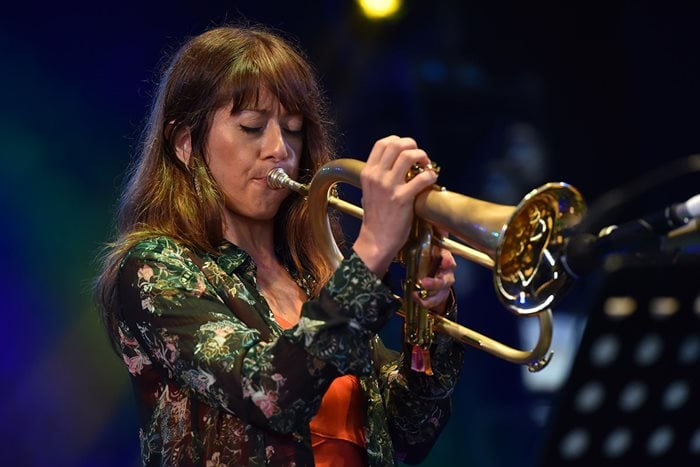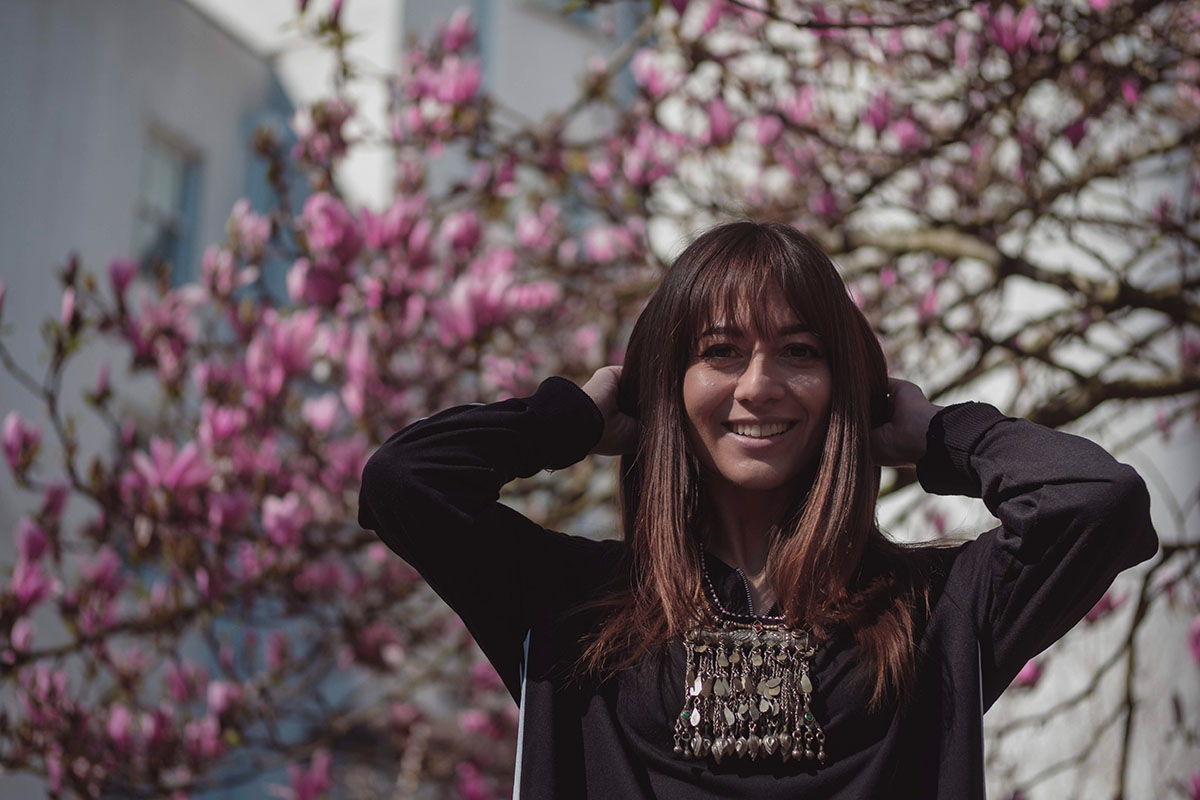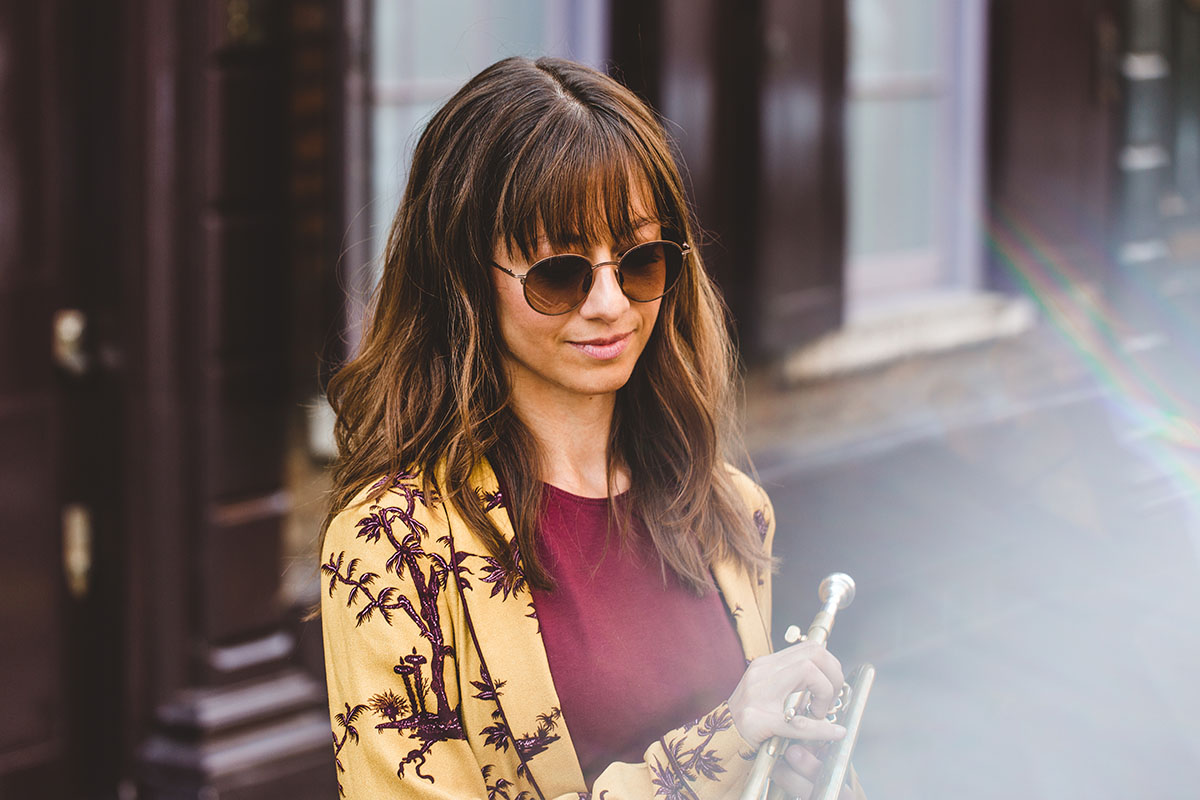The music of Yazz Ahmed is informed by goddesses – the female deities variously wreaking havoc, inspiring the arts and protecting pearl divers in the sea around Bahrain, the island nation in the Persian Gulf that was Ahmed’s childhood home. Her sound is enchanting and otherworldly, rooted in jazz, textured by electronics, and laced with silvery Arabic modes. It balances control and freedom, with experimentalism, rhythms from elsewhere, and whatever else takes Ahmed’s fancy.
Ahmed is a trumpet and flugelhorn player. Her grandfather was Terry Brown, who played trumpet for such UK jazz legends as Joe Harriott, Tubby Hayes and Ronnie Scott. She is also a bandleader and composer, fronting outfits including the 12-piece Halfa Ensemble, the Electric Dreams project, and her eponymous quartet. All three bands play original work and have their own rich, immersive brand of storytelling.
“I always leave my band members space to express their feelings,” she says. “It’s a great contrast to the heavily composed sections and keeps things really fresh when we’re playing live. Sometimes things will go off on a tangent and we’re a bit like, ‘Ah, how do we get this back?’. But that’s the fun and excitement of jazz.” She smiles, “So I do like to let the band members speak. It’s not all about me, you know?”
Believing the hype and checking in with the inner critic
With three solo albums, several EPs, and high-profile collaborations with the likes of Radiohead and art-rockers These New Puritans, Ahmed has forged a career worth talking about. Packed audiences at festivals and venues around the world, plus consistent rave reviews, inclusion on ‘Best Of’ lists and such prestigious gongs as the 2020 Jazz FM Act of the Year all attest to as much. But she is wary of believing the hype. “I don’t feel I’m remarkable, so all this recognition can feel a bit daunting,” she says. “I have to remind myself that it’s for a reason, and try and stay honoured and grateful.”
 The flugelhorn is just one of the instruments that Ahmed uses to create her varied soundscapes. © C Brandon / Getty Images
The flugelhorn is just one of the instruments that Ahmed uses to create her varied soundscapes. © C Brandon / Getty Images
There was a time when her inner critic would rubbish the compositions she’d spent days and weeks creating. Nonetheless she released a promising debut album, 2011’s Finding My Way Home her first foray into fusing modal jazz with the Arabic music she’d heard in Bahrain. Music that she wouldn’t fully explore until she was in her early twenties, and studying for a Masters degree at the Guildhall School of Music and Drama in London.
“My grandfather gave me my first trumpet lesson, teaching me the C major scale,” says Ahmed, who relocated to south-west London aged nine with her mother and sisters and for the longest while missed simple things such as digging in the sand. “I decided I wanted to be a trumpeter like him,” she continues. “Music lessons were on offer at my school so I started learning classical music on trumpet. But there was always jazz in the background at home.”
Her early compositions reflected the musicians she’d been studying at Guildhall: Miles Davis, saxophonist Joe Henderson, trumpeter and flugelhorn player Kenny Wheeler, whose work on the seminal 1992 album Blue Camel by visionary Lebanese oud player Rabih Abou-Khalil would eventually lead her back home. A sort of east-west Kind Of Blue in its mood and scope, the album combined the maqam melodic modes of Middle Eastern music with the anything-goes aesthetics of jazz. For Ahmed, who stumbled upon it late, the album was a revelation: “Blue Camel changed my life, including the way I write music”.
In 2012 she represented Bahrain at the London Cultural Olympiad, then visited Dubai with UK collective Transglobal Underground to perform a British Council commission, In Transit. In early 2015 the jazz education programme Tomorrow’s Warriors commissioned her to write a suite to premiere on International Women’s Day. Ahmed titled the work Polyhymnia after the ancient Greek muse of music, poetry and dance.
Creating water music
Later that same year Ahmed showcased Alhaan al Siduri (Melodies for Siduri), a work that saw her embracing the folk music of Bahraini pearl divers and the traditional wedding songs sung by the island’s all-female drumming groups. “Siduri is a wise female divinity who features in the Epic Of Gilgamesh. Many believe the island she lives on is Bahrain. I like to think of her as the goddess of the Gulf,” says Ahmed, who took the piece to the 2016 Bahrain International Music Festival, her first public performance in her birthplace.
 Blending the desert sounds from Yazz's youth in Bahrain with her grandfather’s jazz stylings, Ahmed likes to mix genres and collaborate with diverse artists. Photo: Seb JJ Peters
Blending the desert sounds from Yazz's youth in Bahrain with her grandfather’s jazz stylings, Ahmed likes to mix genres and collaborate with diverse artists. Photo: Seb JJ Peters
On her return Ahmed had a quarter-tone flugelhorn tailor-made made by Leigh McKinney of Eclipse Trumpets, whose workshop is within bugling distance of Ahmed’s home and garage turned studio-and-practice room. “Leigh also made my trumpet, which he shaped to fit my smallish hands so that it’s easier to hold and more flexible to play. It’s a very physical instrument,” she says. “Sometimes the trumpet wins and sometimes it doesn’t. It’s kind of like being a body-builder. You have to keep training or you’ll lose your strength.”
As a youth she had few female trumpet-playing role models, either in jazz or classical music: “So when I was growing up I started to think, ‘Oh maybe women don’t become trumpet players. Maybe they’re not capable!’ Then I got into MySpace and found women like Ingrid Jensen, and Kiku Collins who played in Beyonce’s band. They helped teach me that you can play trumpet and still be perceived as feminine. I’d always thought I had to be one of the lads.”
It also helped that I’d joined the Musicians’ Union when I was 18 and was getting the odd paid gig here and there. I really valued the feeling of being part of a community, and the useful legal advice and insurance support. I still do.
Side work
“Jonny Greenwood was looking for two flugelhorn players for the next Radiohead album (2011’s The King of Limbs), and asked his friend, the conductor Robert Ziegler, who put him in touch with Noel Langley, who is my partner. Jonny played us recordings of music they were inspired by, one of which was by Alice Coltrane.”
“Radiohead are remarkably hard working and serious. Their commitment to delivering and capturing a passionate performance was a revelation. It made a big impact on the way I now approach rehearsing and presenting my music.”
“I worked with These New Puritans from 2013 to 2015, touring Japan, USA, Mexico, and Europe. I recorded some trumpet for their 2019 album Inside The Rose. I love the way they incorporate field recordings into their tracks. Through them I was inspired to buy my own Kaoss Pad, now an essential part of my sound. I had a Kaoss lesson with Tom Hein from the band in exchange for bagels.”
Discovering her own voice and creativity
When Ahmed’s inner critic continued to shake her confidence, she named it and wrestled it to the ground – and over three years created her 2017 landmark album La Saboteuse. Spacious and inward-looking, it featured Shabaka Hutchings on bass clarinet, Naadia Sheriff on Fender Rhodes and the myths-and-music-informed artwork of London feminist-activist illustrator Sophie Bass.
“I stumbled into electronics,” she says. “It began when I was playing with These
New Puritans and Radiohead and got a lesson on the Kaoss Pad. My friend Jason Singh introduced me to the music of Jon Hassell with its harmonizers and beautiful additions to the trumpet sound. It definitely helped me expand creatively.”
All the while her 2020 album Polyhymnia was gestating. Twenty-six musicians, many of them women (including saxophonists Nubya Garcia and Camilla George, keyboardist Sarah Tandy and guitarist Shirley Tetteh), perform on six movements dedicated to outstanding women: Saudi filmmaker Haifaa Al-Mansour; civil rights heroes Ruby Bridges and Rosa Parkes; The Suffragettes; jazz saxophonist, Barbara Thompson; and Pakistani activist Malala Yousafzai, whose ‘One Girl Among Many’ speech to the United Nations was transformed by Ahmed into melodic fragments and chants.
 As a youth Yazz had few female trumpet-playing role models, either in jazz or classical music. Photo: Seb JJ Peters
As a youth Yazz had few female trumpet-playing role models, either in jazz or classical music. Photo: Seb JJ Peters
Supplemented by sleeve notes that include artistic responses by Sophie Bass (“She really understands my music and it inspires her”), Polyhymnia feels like a major statement. To make it, Ahmed had to spear her saboteuse, her anti-muse.
“I’m always on a journey,” she offers. “Everything is an evolution. I discovered my own voice with La Saboteuse and that album meant I could really express myself on Polyhymnia. So not only does it sound like I’m inspired by these women, I’m adding my flavour and emotional reaction to their achievements.”
Ahmed planted the seed for Polyhymnia several years ago, then allowed it to germinate and grow in an organic, let’s-see-what-happens fashion. It’s a method specific to Ahmed, for whom characters such as La Saboteuse and Polyhymnia serve as conduits, facilitators of her own remarkable creativity.
Future sounds with influenced by Bahraini music
Her next studio album is focused on Siduri, the goddess of the Gulf, and it opens the way for further exploration of Ahmed’s Bahraini roots.
“We’ve started recording pieces and it’s developing into something really lovely,” says Ahmed of a project that features the UK-based vocalist Randolph Matthews amid elements of fidjeri sea music, the lonely songs once practiced by pearl divers about to navigate the depths with just their wits and an empty bag. It’s also inspired by the female drumming groups, who sing and play these big frame drums, and the trancey improvisation that is common in Arab music and shared with jazz. Hopefully it will be a real representation of the fantastic music of Bahrain and the region.” She pauses. “My region,” says Ahmed, owning it.
Be part of the MU community